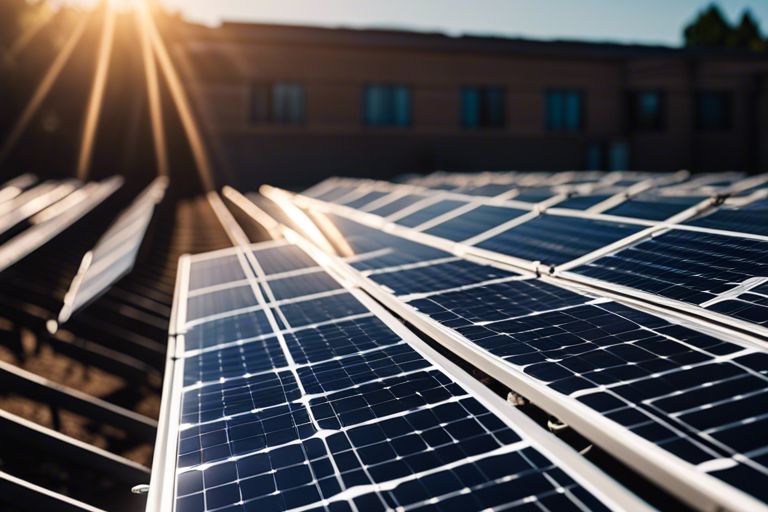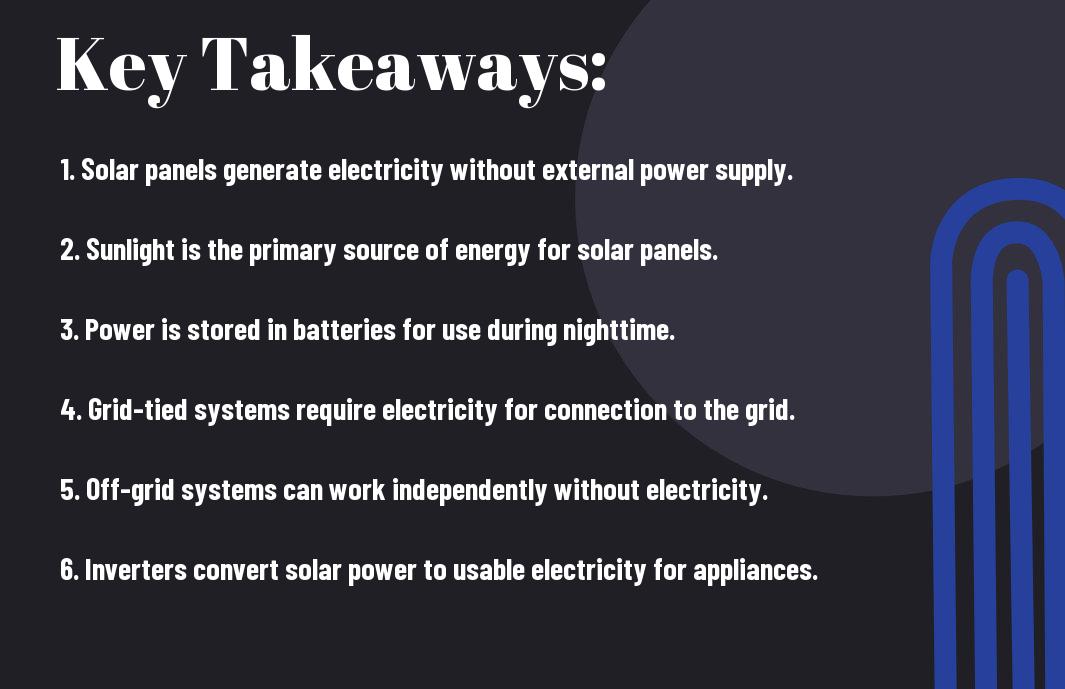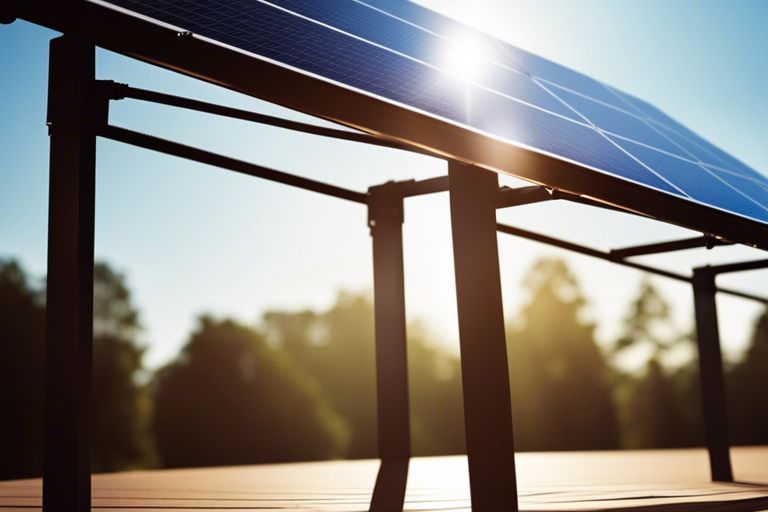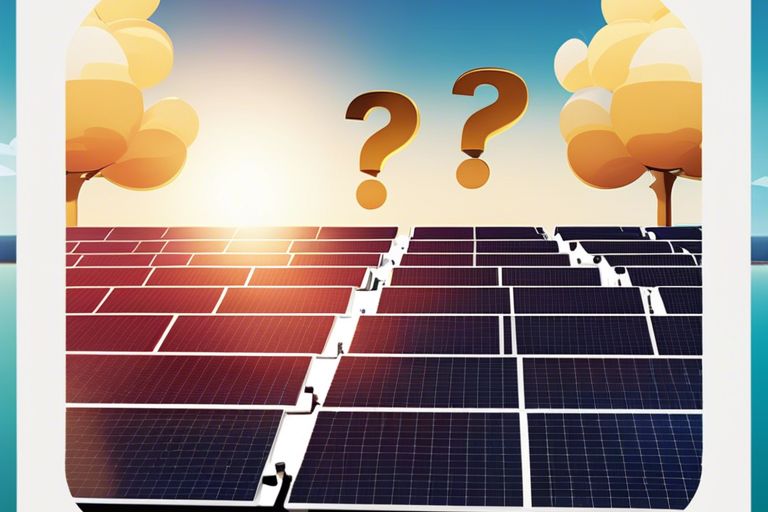It’s a common misconception that you need electricity to run solar panels, but in reality, solar panels generate electricity rather than consuming it. Once the panels are installed and set up, they harness the sun’s energy to produce electricity through a process called the photovoltaic effect. This renewable energy source can then be used to power your home or business, reducing your reliance on traditional electricity sources and saving you money in the long run.

Key Takeaways:
- Solar panels require sunlight, not electricity, to generate power.
- Electricity is needed when connecting solar panels to the grid or storing excess energy.
- Off-grid solar systems use batteries to store excess energy for use when the sun is not shining.
- Solar panels can still generate some power on cloudy days or in low light conditions.
- A reliable grid connection is beneficial for maximizing the benefits of solar energy.

What are Solar Panels?
Definition and Function
The definition of solar panels can be quite simple: they are devices that convert light from the sun into electricity. This process, known as photovoltaics, is the key function of solar panels. In essence, solar panels harness the energy of the sun and transform it into usable electrical power for your everyday needs.
How Solar Panels Generate Electricity
Solar panels generate electricity through the photovoltaic effect. This effect occurs when sunlight hits the solar panels, causing the photons (light particles) to knock electrons loose from atoms within the panel. These freed electrons then flow through the material within the panel, creating an electrical current. This current can be captured and converted into usable electricity to power your home or business.
Solar panels are made up of individual solar cells, typically made from silicon, which are connected together to form a solar panel. The more sunlight that hits the solar panels, the more electricity they can generate. This is why optimal placement of solar panels to receive maximum sunlight is crucial for efficient electricity production.
The Myth-Busting
The Common Misconception
On your journey to understanding solar power, you may have come across the misconception that solar panels require electricity to run. This belief might seem intuitive since solar panels generate electricity, leading to the assumption that they also need it to operate.
Debunking the Myth: Do Solar Panels Need Electricity to Run?
Electricity is not required for solar panels to function. In fact, solar panels operate by harnessing the energy from sunlight and converting it into electricity through a process known as the photovoltaic effect. This means that as long as there is sunlight, your solar panels can generate electricity, regardless of whether you are connected to the grid or not.
The idea that solar panels need electricity to run may stem from a misunderstanding of how they work. While solar panels do produce electricity, they do not rely on an external source of electricity to operate.
How Solar Panels Work
Once again, let’s explore the fascinating process of how solar panels work to convert sunlight into electricity. Understanding this mechanism will give you a deeper appreciation for the amazing technology behind harnessing solar power.
Photovoltaic Effect
Panels utilize the photovoltaic effect to generate electricity. This effect occurs when photons from sunlight strike the solar panel cells, causing the electrons in the cells to become energized. As a result, the electrons start to flow, creating an electric current. This flow of electrons is then captured and converted into usable electricity to power your home or business.
Converting Sunlight into Electricity
On a molecular level, each solar panel cell is made up of silicon atoms bonded together. When sunlight hits these atoms, it knocks loose the electrons, allowing them to flow freely. This movement of electrons creates a direct current (DC) within the panel. The DC is then converted into alternating current (AC) by an inverter, making it compatible with the electrical grid in your home or building.
Sunlight is a free and abundant source of energy that can be harnessed through solar panels to provide clean electricity. By understanding the intricate process of converting sunlight into usable power, you can make informed decisions about incorporating solar energy into your daily life.
The Role of Inverters
What is an Inverter?
Unlike the solar panels themselves, which are responsible for converting sunlight into electricity, inverters play a crucial role in the process of harnessing solar power for your home. An inverter is a device that converts the direct current (DC) electricity generated by solar panels into alternating current (AC) electricity that can be used to power your household appliances and electronics.
Converting DC Power to AC Power
On the surface, the process of converting DC power to AC power may seem straightforward, but it requires a sophisticated piece of technology like an inverter to make it happen efficiently. With the help of the inverter, the DC electricity produced by the solar panels is converted into AC electricity that matches the voltage and frequency required by your home’s electrical grid.
A high-quality inverter is vital for ensuring that your solar energy system operates effectively and maximizes the amount of electricity generated by your solar panels. It is important to choose an inverter that is compatible with your solar panels and meets the specific needs of your home to ensure optimal performance and energy efficiency.
Grid-Tied vs. Off-Grid Systems
Many people may wonder about the intricacies of solar panel systems and whether they need electricity to function. To explore deeper into this topic, you can explore the differences between grid-tied and off-grid systems. For a thorough explanation of this topic, you can read more about Do solar panels need electricity to work.
Grid-Tied Systems: Connecting to the Grid
Systems that are grid-tied rely on a connection to the utility grid to function efficiently. In these setups, excess solar energy generated during the day can be exported back to the grid, earning you credits that can offset your electricity consumption during low-sunlight periods or at night. This type of system ensures a reliable power supply even when your solar panels may not be generating electricity at full capacity.
Off-Grid Systems: Standalone Power Generation
Standalone solar power systems, on the other hand, operate independently of the grid. These setups are ideal for remote locations or areas where connecting to the grid is not feasible. With off-grid systems, your solar panels charge batteries during the day, storing excess energy for use when the sun is not shining. This independence allows you to have a self-sustaining power source that can provide electricity even during grid outages or in off-grid locations.
Understanding the differences between grid-tied and off-grid solar systems can help you determine the best option based on your energy needs and location. Whether you choose to connect to the grid or opt for standalone power generation, solar panels offer a sustainable and reliable source of electricity for your home or business.

Energy Storage and Backup
Battery Banks and Energy Storage
After harnessing energy from the sun with your solar panels, you may wonder what happens when the sun goes down or during cloudy days. Energy storage solutions like battery banks can store excess energy generated by your panels. These stored reserves can then be used when sunlight is not available, ensuring a continuous and reliable power supply for your home.
Backup Power Systems for Solar Panels
After installing solar panels on your property, it’s crucial to consider backup power systems to ensure uninterrupted electricity. An effective backup power system can kick in during power outages or when your solar panels are not generating enough energy. This backup ensures that you can still power your crucial appliances and devices, providing peace of mind in case of emergency situations.
Power outages can occur unexpectedly, leaving you without access to electricity. With backup power systems for solar panels in place, you can rest assured that your home will still have power when you need it most. These systems can be seamlessly integrated with your existing solar panel setup, offering a reliable source of electricity during any situation.
Conclusion
Presently, you have learned that while solar panels generate electricity from sunlight, they do not actually require electricity to function. Solar panels operate by converting sunlight into usable electricity through photovoltaic cells, making them a sustainable and environmentally-friendly energy source. By harnessing the power of the sun, you can effectively produce clean energy to power your home, reducing reliance on traditional fossil fuels and contributing to a greener future.
As you consider incorporating solar panels into your own energy system, remember that while they do not need electricity to run, they do require proper installation, maintenance, and integration with your existing electrical setup. By understanding how solar panels work and ensuring they are installed correctly, you can maximize their efficiency and benefits. Embracing solar energy can not only help you save money on utility bills but also reduce your carbon footprint and support a more sustainable energy landscape.
FAQ
Q: Do you need electricity to run solar panels?
A: No, solar panels do not require electricity to operate. They generate electricity by converting sunlight into energy through photovoltaic cells.
Q: How do solar panels work without electricity?
A: Solar panels utilize the photovoltaic effect to convert sunlight into electricity. When sunlight hits the solar cells in the panels, it creates an electric field that allows electrons to flow, generating direct current (DC) electricity.
Q: Can solar panels work during cloudy days or at night?
A: While solar panels are more efficient in direct sunlight, they can still generate some electricity on cloudy days or during low-light conditions. However, they do not produce electricity at night when there is no sunlight.
